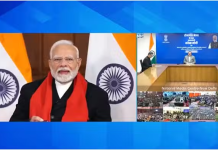As the House debated the sensitive issue just a few weeks before the country votes to elect its next government, parties used the opportunity to address their core political needs and areas.
While the BJP-led government asserted that the Bill should not be viewed from the prism of politics but humanity and rejected the allegation that it was aimed at targeting a particular community. It is all about “insaaniyat aur insaaf”, Law Minister Ravi Shankar Prasad insisted while moving the Bill for consideration and passage), a united Opposition saw it aimed at “criminalising” the entire community.Regional parties RJD and the AIMIM rejected it downright while the Congress sought to maintain a delicate balancing act in line demanding that the “unconstitutional” legislation be referred to a joint select committee of Parliament for greater scrutiny and better sustenance for aggrieved women
When the demand for a joint committee was rejected by the government, it staged a walkout. Eventaully, the Bill was passed with 245 voting in its favour and 11 opposing.
Till the end, Opposition leaders, including Congress’ Mallikarjun Kharge , AIADMK leader P Venugopal, TMC’s Sudip Bandhopadhyay, AIMIM’s Assaduddin Owaisi, continued to maintain that imprisonment of three years reduced the scope of rapprochement between the estranged couple. The Bill was against the spirit of the Constitution and violated several articles dealing with the rights of individuals, they said
Participating in the debate, Congress’ Sushmita Dev said its real purpose was not to empower Muslim women but to “penalise” Muslim men and that criminalisation of triple talaq was against the Supreme Court verdict.
“In the name of empowerment you (the government) are giving nothing but a criminal case to women…The aim of the bill is not to empower Muslim women but to penalise Muslim men,” she said.
Moving a statutory resolution opposing an Ordinance issued earlier (which the Bill seeks to replace), N K Premchandran of the Revolutionary Socialist Party said the legislation was bad in law as it aimed to criminalise a “civil wrong”. Owaisi, who claimed that the government had not consulted stakeholders, let alone those opposing the Bill while formulating it, insisted that the problem was not “triple talaq but desertion”.
Defending the legislation, Prasad said the accused husband would attract a jail term only if he was convicted. Many cases would be resolved at the trial level itself, he said, asserting that the Bill was not aimed at victimising any community. “It’s not about politics but empowerment and justice for women,” he said, accusing the opposition parties of creating hurdles in its passage because of “vote bank politics”.
Prasad said 477 cases of triple talaq have been reported since January 2017. He also cited cases, including that of a professor giving talaq to his wife over Whatsapp and a lawyer to his wife because she too wanted to practice law
BJP’s Meenakshi Lekhi, who quoted the Quran extensively in her speech, accused the Congress of following appeasement politics, and likewise union minister Smriti Irani. “I will like to ask those opposing the Bill, that in which ‘suraa’ of the Quran is ‘talaq-e-biddat’ mentioned,” questioned Lekhi.
Though the Bill sailed through the Lok Sabha because of the NDA’s sheer numbers in the House, it remains to be seen how it fares in the Rajya Sabha where the BJP-led coalition remains stressed on numbers.
Opposition parties are demanding that the Bill should be sent to a joint select committee for a greater scrutiny even as the government says that it has taken not of concerns expressed by members earlier and amended it accordingly.
The new Bill has also made the offence compoundable, meaning that the case can be withdrawn if the man and his estranged wife reach a compromise. To avoid its misuse, only the aggrieved wife and her close blood relatives can file an FIR.
The earlier bill was also approved by the Lower House.
However, as it continued to face resistance in the Rajya Sabha, the government issued an Ordinance in September, incorporating the amendments.
An ordinance has a life of six months. After the session begins, it has to be replaced by a Bill passed by Parliament within 42 days (six weeks). The government is at liberty to re-promulgate the Ordinance if the Bill fails to get through Parliament.
















































